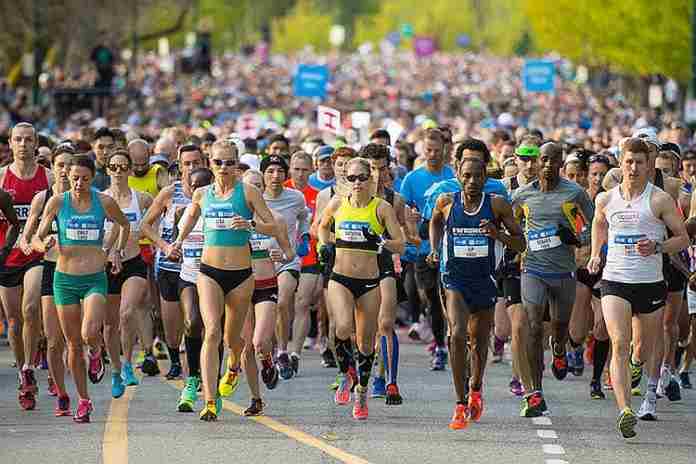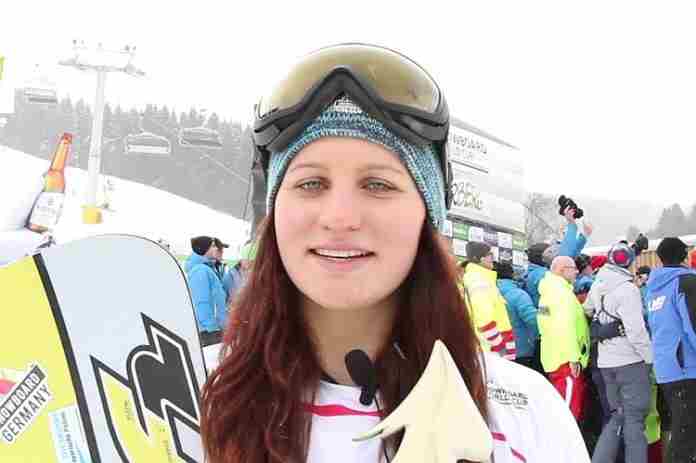The Paris 2024 organizing committee created plenty of headlines last week with its announcement that it would ask the International Olympic Committee to approve four “added” sports to the Games: Skateboarding, Sport Climbing, Surfing and Breakdancing.
The latter drew most of the attention and the Paris 2024 folks created a gaudy, 29-page press kit (here) to explain the request and the appeal of the sports. But the brochure also emphasized what could be the most important element to be introduced at the 2024 Games.
Mass participation events.
The Olympic Games have always been about contests between the finest athletes in the world. For the first time, Paris is proposing a not-yet-defined program of events in which the public can take part, on the same course and under (almost) the same conditions as the Olympic participants.
The obvious first choice is the marathon, where the medal race will be held in the morning and then a public race – over the same course – can be held later in the day. This makes perfect sense and is more or less the same model as used for the World Marathon Majors races, although the separation of the start times for Olympic runners and the public will be much longer.
Paris 2024 did not mention other events, but suggested there will be others. There are many candidates, including, but not limited to:
● Archery: Tournament on the Olympic range
● Athletics: Walking races, on the Olympic course
● Basketball: 3-on-3 tournament, with some games at the Olympic site
● Cycling: Road Race, on the Olympic course
● Swimming: Open Water race, on the Olympic course
Each of these sports is already popular in France, and only the basketball event requires a team instead of individuals.
While there are events in these and all other sports on the Olympic program available during the year, the idea of having them take place at the Olympic sites and in the Olympic period – either just before or during the Games – is a leap forward.
The Games have traditionally been a pure spectator experience for those who are not members of a national Olympic team. Including an opportunity for participation in an event during the Games at the relevant venue changes the nature of the event into one which invites everyone to share in the fitness and community part of the Olympic Movement, instead of simply cheering.
Because of the heavy use of hotels and other accommodations during the Games, such events are not likely to draw visitors not already coming. So these will focus attention more on local residents, for whom the Games could be simply a transient experience.
The London 2012 organizers sold the concept of having the Games, in part, on using the event to increase sports participation (and community health). A 2015 study showed that there was an increase in physical activity in England after the Games were awarded to London in 2005. It peaked in 2012 (of course), but has been receding – slowly – ever since.
So the possibilities are there, and the British program of activity has not been tied to the 2012 Games as a legacy effort. Paris offers the possibility to do that, and is an opportunity to incorporate fitness activities as a legacy program in every city which hosts a Games going forward.
It’s easy to conceive of a tie-in between worldwide fitness travel and Olympic cities, where visitors can participate in sporting activities at Olympic sites of past Games. There is an organization called the World Union of Olympic Cities, headquartered in Lausanne, which could be the coordination point for an annual calendar of special events of this type.
Sound far-fetched? Consider the comments of Federation Internationale de Ski (FIS) President Gian-Franco Kasper (SUI) in his controversial interview with the Swiss Tages Anzeiger newspaper in early February; asked if the federation could make more money with a stronger marketing campaign, he replied, “We are first and foremost an advertising agency for winter tourism.”
The Paris folks will have plenty of challenges ahead of them, and trying to add in public events on top of the Olympic competitions will generate headaches that they will sometimes with they didn’t have. But the mass participation concept is a new and worthwhile extension of the Olympic ideal and can have obvious tie-ins with any major event, such as a regional or world championship. The IAAF is already experimenting with this for its events as well.
And the concept of “extending” the reach of a Games to influence future participation has been shown to work on the youth level, especially by the still-vibrant and widely-underappreciated LA84 Foundation, a continuing legacy of the 1984 Los Angeles Games.
This could well be the true legacy of the Paris 2024 Games, including the continuing, future use of its symbols and design scheme (alert for the IOC and Paris 2024 licensing staffs). It will be worthwhile for future organizers and bidders to consider this aspect of the Games quite closely and incorporate it into their own planning. Tres bien, Paris!
¶
Further to our story on the added sports requested by Paris 2024, the organizing committee’s press kit included more details on the request:
● Breakdancing: 32 athletes ~ 2 events (men and women)
● Skateboarding: 96 athletes ~ 4 events (Street and Park for men and women)
● Sport Climbing: 72 athletes ~ 4 events (Speed and Combined for men and women)
● Surfing: 48 athletes ~ 2 events (Shortboard for men and women)
The total is 248 athletes across 12 events, more than had been suspected based on the 2020 event totals, but still far less than the 447 athletes expected for the five sports added for Tokyo. And it is worth noting that the Paris 2024 presentation stated that these 248 athlete spots “will form part of the maximum number of 10,500 set out in the Olympic Charter.” So other sports will have to be reduced to make room for the new events!
The changes in Sport Climbing, to break the Speed event away from a combined event for Bouldering and Lead, will quell some of the unhappiness from athletes in that sport who do not favor the three-discipline combined event slated for Tokyo.
Naturally, the Paris 2024 requests are only the start of the process. The IOC Executive Board will consider the requests at its March meeting in Lausanne, then the IOC Session will vote on adding these sports in June. The final line-up of sports and events for the 2024 Games is scheduled to be approved in December of 2020.
Rich Perelman
Editor



























